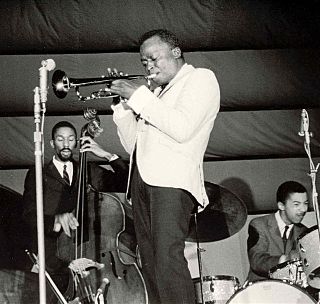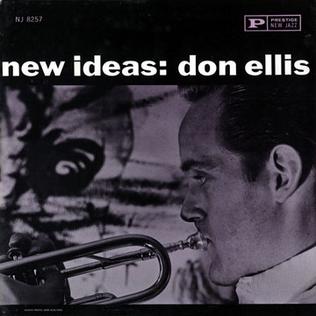
Coleman Randolph Hawkins, nicknamed "Hawk" and sometimes "Bean", was an American jazz tenor saxophonist. One of the first prominent jazz musicians on his instrument, as Joachim E. Berendt explained: "there were some tenor players before him, but the instrument was not an acknowledged jazz horn". Hawkins biographer John Chilton described the prevalent styles of tenor saxophone solos prior to Hawkins as "mooing" and "rubbery belches." Hawkins cited as influences Happy Caldwell, Stump Evans, and Prince Robinson, although he was the first to tailor his method of improvisation to the saxophone rather than imitate the techniques of the clarinet. Hawkins' virtuosic, arpeggiated approach to improvisation, with his characteristic rich, emotional, and vibrato-laden tonal style, was the main influence on a generation of tenor players that included Chu Berry, Charlie Barnet, Tex Beneke, Ben Webster, Vido Musso, Herschel Evans, Buddy Tate, and Don Byas, and through them the later tenormen, Arnett Cobb, Illinois Jacquet, Flip Phillips, Ike Quebec, Al Sears, Paul Gonsalves, and Lucky Thompson. While Hawkins became known with swing music during the big band era, he had a role in the development of bebop in the 1940s.

Joseph Rudolph "Philly Joe" Jones was an American jazz drummer.

Roy Owen Haynes is an American jazz drummer. He is among the most recorded drummers in jazz. In a career lasting over 80 years, he has played swing, bebop, jazz fusion, avant-garde jazz and is considered a pioneer of jazz drumming. "Snap Crackle" was a nickname given to him in the 1950s.

William McKinley "Red" Garland Jr. was an American modern jazz pianist. Known for his work as a bandleader and during the 1950s with Miles Davis, Garland helped popularize the block chord style of playing in jazz piano.

Arthur S. Taylor Jr. was an American jazz drummer, who "helped define the sound of modern jazz drumming".

Edward Hammond Boatner Jr., known professionally as Sonny Stitt, was an American jazz saxophonist of the bebop/hard bop idiom. Known for his warm tone, he was one of the best-documented saxophonists of his generation, recording more than 100 albums. He was nicknamed the "Lone Wolf" by jazz critic Dan Morgenstern because of his tendency to rarely work with the same musicians for long despite his relentless touring and devotion to jazz. Stitt was sometimes viewed as a Charlie Parker mimic, especially earlier in his career, but gradually came to develop his own sound and style, particularly when performing on tenor saxophone and even occasionally baritone saxophone.
Ronald Mathews was an American jazz pianist who worked with Max Roach from 1963 to 1968 and Art Blakey's Jazz Messengers. He acted as lead in recording from 1963 and 1978–79. His most recent work was in 2008, as both a mentor and musician with Generations, a group of jazz musicians headed by veteran drummer Jimmy Cobb. He contributed two new compositions for the album that was released by San Francisco State University's International Center for the Arts on September 15, 2008.

The Miles Davis Quintet was an American jazz band from 1955 to early 1969 led by Miles Davis. The quintet underwent frequent personnel changes toward its metamorphosis into a different ensemble in 1969. Most references pertain to two distinct and relatively stable bands: the First Great Quintet from 1955 to 1959, and the Second Great Quintet from late 1964 to early 1969, Davis being the only constant throughout.
Charles Lawrence Persip, known as Charli Persip and formerly as Charlie Persip, was an American jazz drummer.

African Waltz is an album by jazz saxophonist Cannonball Adderley, released on the Riverside label and performed by Adderley with an orchestra conducted by Ernie Wilkins. The title track had been a UK hit single for Johnny Dankworth.

This Is How I Feel About Jazz is a 1957 album by American musician Quincy Jones, his first full-length album as a bandleader after a recording debut with the 1955 split album Jazz Abroad.

Wynton Kelly! is an album by jazz pianist Wynton Kelly released on the Vee-Jay label featuring performances by Kelly with Paul Chambers or Sam Jones and Jimmy Cobb recorded in 1961. Additional performances from these sessions were released as Someday My Prince Will Come.

A Garland of Red is the debut album by pianist Red Garland, recorded in 1956 and released on the Prestige label.

Rojo is an album by jazz pianist Red Garland, released in 1961 on Prestige Records, featuring tracks recorded on August 22, 1958. Oscar Peterson, commenting on the track "Darling, Je Vous Aime Beaucoup" in 1961, criticized Garland's left-hand playing, saying: "I found this very, very monotonous. [...] primarily it's that drone-type left hand, punctuated with chords, that he used invariably".

When There Are Grey Skies is an album by the jazz pianist Red Garland, recorded in 1962 and released the following year on the Prestige label.

Soul Burnin' is an album by jazz pianist Red Garland, recorded in 1960 and 1961, but not released on Prestige Records until 1964. The CD reissue features a bonus track, recorded in 1959, which originally appeared on Garland's album Satin Doll, first released in 1971.

Rediscovered Masters is a 1977 double LP by jazz pianist Red Garland releasing previously unissued recordings from sessions held between 1958 and 1961, which was issued by the Prestige label. It was later reissued on two CDs featuring one bonus track. 2 more tracks with the Richard Williams Oliver Nelson quintet can be found on the Soul Burnin' album

Red's Good Groove is an album by American jazz pianist Red Garland with a quintet which was recorded in 1962 and released on the Jazzland label.

New Ideas is an album by trumpeter Don Ellis recorded in 1961 and released on the New Jazz label.

So Warm is an album by jazz vocalist Etta Jones that was recorded in 1961 and released on the Prestige label.

















